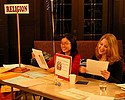Last week Carleton held its annual majors fair. Dozens of academic departments prepared booths where senior representatives for each major could talk to curious underclassmen.
We picked a random selection of departments and asked them to give us a sales pitch for the major.
Mathematics:
"If you like mathematics and you're good at it, it's the easiest major at Carleton," says Andrew Roberts 2007, the math department's representative at the fair. According to the Math Department website, Carleton College's objectives for the math major are to:
- learn a broad range of mathematical topics;
- increase your ability to read and to write mathematical proofs;
- become a competent mathematical problem solver;
- be exposed to the mathematical literature available in our excellent library;
- become aware of the connections between the various branches of mathematics, and between mathematics and other disciplines.
Why should anyone take more math classes than absolutely necessary?
Roberts does not understand why anyone should avoid math classes. He enjoys math and thinks you should, too. "It's kind of like a game," he says.
What sort of jobs do Carleton math majors go into?
If you go on to graduate school and get a master's degree you might get a job as a government codebreaker. Math majors also become engineers, actuaries, and math teachers.
What do you need to do to major in math at Carleton?
First, take the introductory sequence of Calculus I, II, III and linear algebra. Then you take Math 236, Mathematical Structures. It's "a class on how to prove things," says Roberts. It goes back to some of the fundamental concepts that we know about mathematics and examines how we know them. Then hopeful math majors must take six upper-level courses and pass comps.
English
The objective of the study of English is twofold: to study works of literature written in English and other languages, and to improve the student's written communication in English. The student representatives for the English department were Cindy Lys '07 and Chelsea Couillard '07.
There is a popular conception that majoring in English does not prepare you much for a career. Can you help dispel that?
"What you're really leaving Carleton with is really solid skills in communication," says Cindy. "Those skills will be invaluable at any career. English courses teach you the skill of how to think."
What sort of jobs do Carleton English majors go into?
English majors can go into any discipline after graduating. If any generalization can be made, lots of majors go to law school. Chelsea says of the study of law, "It's all essays and writing."
What do you need to do to major in English at Carleton?
You need to take four required introductory courses, six upper-level courses, one course in foreign-language literature, and pass the comps. The English comps can take the form of a detailed essay or an exam.
Geology
Geology is the study of the processes taking place in the Earth's crust. Carleton's geology department was founded by Laurence M. Gould, Carleton's past president and Antarctic explorer.
What do you need to do to major in geology at Carleton?
You need to take the introductory geology course, 42 credits of classes in the geology department, and pass the comps. Additionally, you need to take supporting courses in chemistry, physics, and math.
What sort of jobs do Carleton geology majors go into?
You might become a professor of geology or work for the U.S. Geological Survey.
Is Minnesota geologically interesting?
The southern half of Minnesota is full of oceanic rocks left over from a huge sea-level rise that took place 500 million years ago. The rocks in northern Minnesota were formed by a mid-continental rift that took place 1.1 billion years ago. Some of the oldest rocks in North America can be found there. So yes, Minnesota is very geologically interesting.


